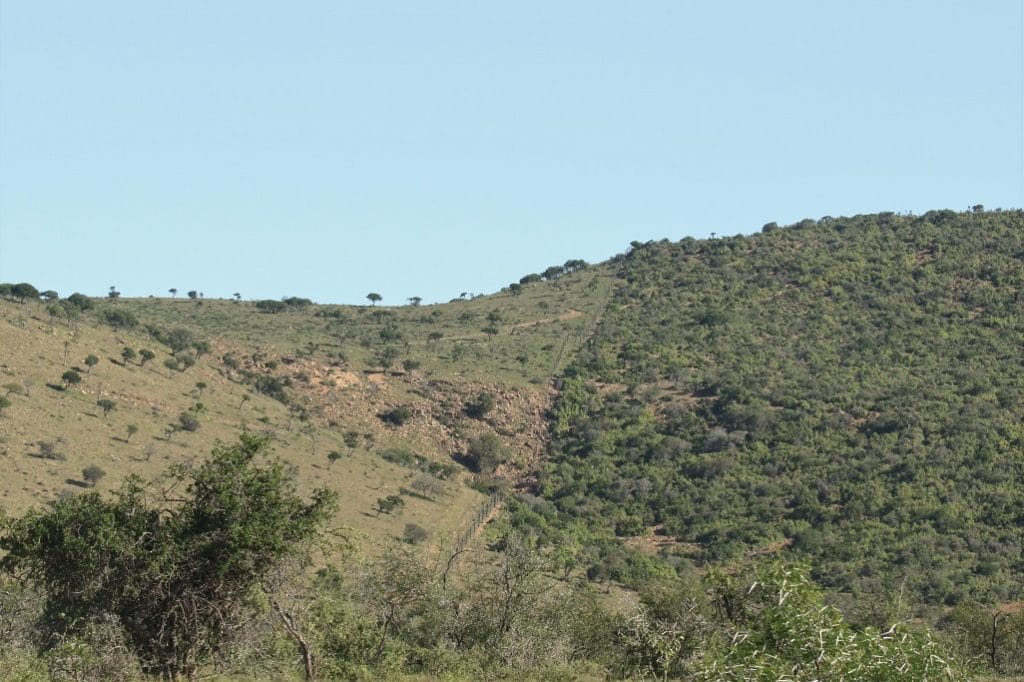Owning and running a game reserve in the Eastern Cape is a far cry from running the same in a place like the lowveld, where the more commercially-known reserves can be found. However, our slice of Karoo paradise is no less special, which can be attested to by Senior Environmental Officer at the Eastern Cape Provincial Department of Environmental Affairs and Tourism, Frikkie Rossouw. Frikkie has been involved in caring for the region since 1989, in various roles, and has been active in the Provincial Department of Environmental Affairs since 2005.
Magic Hills Private Game Reserve has built a positive relationship with Frikkie since acquiring and establishing the reserve in 2002. Frikkie has been instrumental in the development of the region’s biodiversity program, and other functions relating to legislation – such as transportation of animals, as well as fauna and flora.
How the Magic Hills Land has Evolved
Speaking of the region that we now know as Magic Hills Private Game Reserve, Frikkie comments, “Over 150 years ago, in the days of the early travellers, such as Thomas Baines and François Levaillant, the land was untouched. The early explorers would have found wide open spaces, ravines, mountain folds and savannah, with no fencing and droves of wildlife. Nomadic herds of elephants would have passed through the area, following the Sundays River, and while the region would have been harsh, as it is today, thickets of tough, natural vegetation, such as Spekboom, would have blanketed parts of the land which are now arid.”
As time evolved, so did the landscape, with the settling of livestock farmers, and erection of fences to divide the properties. The result, in many cases, was severe overgrazing of the land, where stock rotation was not possible. As wildlife was unable to naturally migrate as they once did, the vegetation took a hard knock, as did soil conditions and erosion. The once-rampant thickets that were known to the area dwindled and, in some regions, disappeared altogether.
And so we stand today, confronting the oversights of our forefathers. Better equipped now with science and knowledge, and the support of men like Frikkie, we have a responsibility to restore the land of Magic Hills Private Game Reserve to the Eastern Cape wonderland that it once was.
Challenges and Triumphs: the Healing of Magic Hills and Surrounds

When speaking of the challenges faced by a reserve such as Magic Hills, Frikkie points out again that the rehabilitation of vegetation is laborious, but critical, to the restoration of the region’s natural state. In the midst of a 7-year drought, the Karoo Eastern Cape reserve has to be mindful of how to approach the restoration of thickets, where growth in and of itself is slow. Other challenges include the upkeep of roads, which are unsupported by government, and falls to the reserve to maintain.
On the brighter side, Frikkie notes that the Magic Hills Game Reserve is now headed by new management with a long career history in conservation, Declan Hofmeyr. This, combined with a solid team that shares the passion and vision, bodes well for the reserve, and the region as a whole. Some of the reserve’s most winning attributes also include it’s proximity to Port Elizabeth, and the fact that it is a malaria-free destination for tourists.
Although the Eastern Cape game reserve now boasts the Big Five, Magic Hills also offers tourists the opportunity to see other desirable species such as kudu, giraffe and gemsbok. Frikkie takes the time to note the benefits of Magic Hills Private Game Reserve’s tourism and ecotourism model: “In some communities surrounding Magic Hills, the unemployment rate is as high as 90%. A destination such as Magic Hills has the capacity to create jobs, teach skills and uplift communities. In the current climate, for every tourist, three to four people are employed. That is significant in our area.”
When asked about the future of Magic Hills Private Game Reserve, Frikkie commends the reserve for its decision to remove internal fences, and continue its journey toward a more natural environment for indigenous animals and plants. According to Frikkie, “Bigger reserve spaces are better, and require less management, as nature takes its course.” What’s more, Frikkie expresses his hopes that the Magic Hills’ Addo Expansion project will roll out successfully, leading to a more sizable protected area that could potentially be declared a contractual national park under an organization such as SANPARKS.
Tourism Meets Conservation on this Game Reserve in Eastern Cape The Magic Hills Private Game Reserve continues to evolve, toward a future where the environmental misdeeds of our ancestors are corrected. Working with the authorities, such as Frikkie Rossouw, gives us a greater chance at developing an expanse of nature so magnificent that we can proudly share with the rest of the world through ecotourism.



